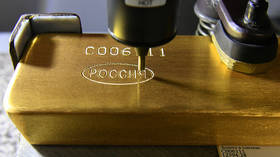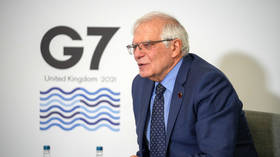EU admits goal of anti-Russian sanctions

The embargoes imposed by the European Union against Moscow are intended not to stop the fighting in Ukraine, but wreck the Russian economy, the bloc’s foreign policy commissioner Josep Borrell said in Brussels on Monday. Borrell also announced an EU ban on Russian gold exports later this week.
“The EU sanctions will not stop the military activities in Ukraine, but ought to create a lot of problems for the Russian economy,” Borrell said, adding that the EU “cannot afford sanctions fatigue.”
Russian President Vladimir Putin “counts on the fatigue of democracies with sanctions,” the EU high representative for foreign policy said. “It is not easy but we must continue to put pressure on the Russian economy. Our European societies must not abandon this policy,” he added.
Borrell’s comments echoed the argument he made in a blog post over the weekend, responding in part to Hungarian PM Viktor Orban’s statement that the embargo policy has been “miscalculated” and harmed the EU members more so than Moscow.
The Spanish diplomat also argued the embargoes were not to blame for the pain at the pump, saying the price of oil was the same now as it had been in February.
Borrell revealed that the EU is planning to impose a ban on Russian gold later this week, in a mini-package of measures intended to improve the implementation of existing sanctions. The ban would affect the “the direct or indirect import, purchase or transfer of gold, which constitutes Russia’s most significant export after energy,” according to the wording leaked to the Guardian.
While Brussels is officially committed to supporting the Ukrainian government with a €9 billion ($9 billion) emergency loan, the Wall Street Journal reported no money had been paid out yet. Meanwhile, the fund to supply Kiev with weapons has been capped at €5.7 billion until 2027.













